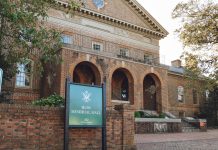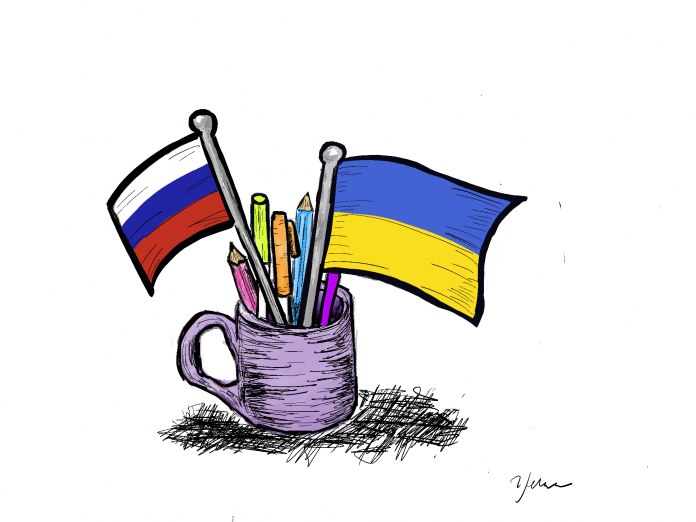Richard S. Perles Professor of Government Paula Pickering was initially hesitant to move foreign policy to the front of her Russian and Post-Soviet Politics syllabus in the Spring 2022 semester. But, as signs of a full-scale Russian invasion of Ukraine grew, Pickering felt she had no other choice but to restructure the course in response to the events.
“I was following things in December and January very closely,” Pickering said. “I believe it’s important to understand the historical, domestic, political, social, and economic context of Russia in order to then understand foreign policy and security policy.”
Of all the departments and programs at the College of William and Mary, perhaps none has felt the impact of world events over the past year more than the Russian and Post-Soviet Studies program.
“I remember the night very distinctly,” former Russian House Co-President Kathryn Webb ’23 said. “We were all sitting in one of the Hardy [Hall] lounges with our friends who lived in the Russian House, but also from the general department. We just kind of sat there for a while. Nobody really talked.”
Professors and students alike acknowledge the particularly difficult experiences for those with relatives in Ukraine, Russia or both. Many have had to balance academics with the emotional toll of processing these events and supporting the community around.
Yasha Barth ’24 and former Russian House Co-President Daniella Marx ’24, both RPSS majors, are deeply involved in the program’s community. Marx highlighted the RPSS community as a protective and welcoming space to support fellow students.
“While it’s been emotionally difficult, it’s also united us and made us stronger than usual,” Barth said.
Students and faculty also acknowledged that some community members have experienced unprovoked hostility and discriminatory remarks for having Russian ancestry.
“Even people who don’t have family [there], it’s upsetting to see the brutality,” Pickering said. “People who study Russian and Post-Soviet Studies, who are learning holistically the language, culture, politics, economics, they want to be studying there. All of a sudden, that dramatically changed their possibilities.”
Nevertheless, discourse between the RPSS community has remained respectful and somber in light of the war.
“I think moving forward, we’ve been very introspective into how the department approaches the Soviet legacy,” Webb said.
On February 27, 2022, RPSS faculty released a statement strongly condemning the war and pledging support for Ukraine. Many faculty members frame the current war in Ukraine not as a conflict that began in 2022, but rather, one that has been ongoing for nearly a decade.
“It started during the [Russian] annexation of Crimea in 2014,” associate professor of Russian and Post-Soviet Studies Alexander “Sasha” Prokhorov said. “The war has been happening for all those years.”
In March 2022, the Russian House organized a Ukrainian Solidarity event in partnership with the Rainbow Coalition and Student Assembly representatives where community members could demonstrate collective unity and sorrow.
The RPSS program continues to sponsor events and maintains awareness about the war. Recent speakers at the College include New York Times Moscow Correspondent Valerie Hopkins ’09, Geospatial Intelligence Team Lead and Russia analyst at the Institute for the Study of War George Barros ’19 and U.S Army Colonel (Ret.) Yevgeny “Eugene” Vindman, a senior member of the recently-created Atrocity Crimes Advisory Group for Ukraine.
The war in Ukraine sparked innovative data science research and collaboration between the RPSS program and other campus communities, including the Modern Languages, Film and Media Studies, Gender Sexuality and Women’s Studies, Data Science departments, Global Research Institute and Reves Center.
RPSS Program Director Elena Prokhorova and Senior Lecturer of Data Science Dana Willner currently co-teach a course in which students analyze Russian cultural texts by mixing elements of humanities and computational sciences. Prokhorova mentioned that around one third of students’ final projects concern the war in Ukraine.
Ongoing student projects include analyzing speeches by Ukrainian President Volodymyr Zelenskyy and Russian President Vladimir Putin, Russian troll activity on Twitter and comparing Spotify downloads between Russia and neighboring countries.
Beyond the classroom, student researchers at the College are applying the effects of the war to their own work. The Geospatial Evaluation and Observation Lab conducted research analyzing the environmental impact of armed conflict in Ukraine, and the Exodus Project researched the challenges of LGBTQ+ Ukrainian refugees.
Since the start of the war last spring, students in related organizations have fostered greater inclusions. Barth and Marx are both leading staff members of the student-run RPSS film series, which presents five to six films each semester.
“Since the war, we’ve tried to incorporate more films outside a specifically Russian ethnic context,” said Marx. “Having more variety and post-Soviet and post-communist narratives.”
Barth is also the president of the recently renamed Melodia Eastern European Instrument and Vocal Ensemble, formerly known as the Russian Music Ensemble.
“Music goes beyond political spheres,” Barth said. “Our ensemble is not making any political statements but is using music to show off what each country is about and show that we can unite through music to overcome difficulties.”
The war also prompted the relocation of the College’s Russian language and culture summer study abroad program from St. Petersburg, Russia to Vilnius, Lithuania. After canceling the program due to COVID-19 restrictions in 2020 and 2021, the program was postponed once again in 2022 after the invasion began.
“When the war started, everything froze,” associate professor of History and Global Studies Maria Cristina Galmarini, the faculty leader of the program, said. “It was impossible because of issues of visas and safety.”
While many other universities in the United States relocated similar programs to countries like Latvia, Georgia, and Kazakhstan, the College utilized preexisting contacts in Lithuania from a Project Global Officer grant it received from the Department of Defense in 2021. The grant sponsors nationwide critical language education and overseas studies for ROTC students and established ties between the College and the European Humanities University in Lithuania and National Central University in Taiwan.
For the College’s civilian program, the Russian language component will remain similar, but the cultural focus will shift. During the original study abroad program, a course taught in St. Petersburg would require students to select and research the history behind a site of memory in the city.
“Now, of course, I cannot keep doing that,” Galmarini said. “Instead, I will teach a course on the relations between Russia and the Baltics.”
Both programs are set to have their inaugural sessions this summer should the security situation remain stable. Senior lecturer of Russian Language and Culture Bella Ginzbursky-Blum will lead the Project GO Russian Language program in the states, and Prokhorov will oversee the program internationally.
The RPSS community has also made impacts off-campus.
Prokhorova, Prokhorov, Ginzbursky-Blum and Assistant Director of the Studio for Teaching and Learning Innovation Mike Blum raised $3,500 for Salam Lab, a non-governmental organization in Krakow, Poland, which helps resettle Ukrainian refugees.
In January 2023, Prokhorov and his daughter visited Krakow for 10 days to deliver funds and goods, as well as volunteer at Salam Lab and another non-governmental organization, Soup for Ukraine, to provide food for refugees.
“It was a very rewarding experience,” Prokhorov said. “But what was also very heartbreaking was to see how many displaced people are in the area. And they all need living space and food.”
Prokhorov noted the emotional toll of the trip.
“The flow is steady unfortunately,” Prokhorov said. “They keep bombing, people keep on arriving. It’s heartbreaking. It doesn’t go away. It makes me cry.”



































